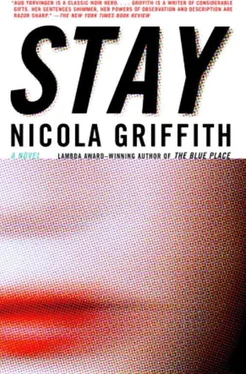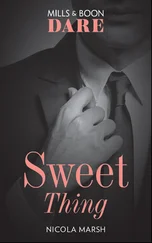Forty-five minutes gone.
The box was made of steel, and locked. I tilted it gently and recognized the sliding thump. A handgun. I put it back. Then I took out the papers.
A seven-year-old girl with soft, toffee brown eyes and sharp baby teeth beamed at me from the head-and-shoulders photo. Her hair, cut just longer than her ears, was the color of rich, fertile mud, the kind you can’t help plunging your hands in. I turned it over. The next sheet was typed. It had a bar code label at top right, a miniature black-and-white version of the bigger color photo on the left, and a large, florid signature at the bottom. It was written in Spanish, a medical report of a seven-year-old girl, one Luz Bexar, healthy and reasonably nourished, good teeth, good eyes, virgo intacta, no intestinal parasites, small scar above right elbow, vaccinations given on the following dates. Behind that, with the same bar code at the top right, was an adoption certificate, again in Spanish, with two signatures: the rounded, laborious letters of someone who doesn’t write very often, and George G. Karp, of New York, New York. There was a catalogue of foster families in various parts of the country, followed by a receipt acknowledging Karp’s payment and confirming his choice of the Carpenter residence in the town of Plaume City, Arkansas. After that there were progress reports dated at six-monthly intervals. I learned that she now spoke English fluently, had an excellent memory for rote learning as evidenced by progress with the Bible, was nimble—enclosed one embroidery sample—modest, demure, and clean. A medical update was stapled to the latest report: she was now well nourished, and still virgo intacta. The picture on the Mexican passport was the same one on the medical report; the visitor’s visa to the United States had long since expired. There were two more pictures, one taken a year ago, one about three months ago. In the first, her hair had grown and lay about her shoulders in a wild swirl, her baby teeth were gone, and the light in her eyes did not fit with “demure” or “modest.” My hand was now shaking so much that I had to lay the second photo on the floor: her hair was neat and her eyes wary. I didn’t read the rest.
What I’d told Tammy was true. I was not in the revenge business; I was not the universal protector of the weak. I was only here to get the tape.
Fifty minutes gone. I put everything back in the folder, put the folder back on the shelf, closed the false front, turned away, then turned back and opened it again. What Geordie did to adults who knew the ways of the world was one thing, but this was another.
While I fed Luz’s documents into Karp’s photocopier one sheet at a time, a process made slow and clumsy by my gloves, I listened for the elevator. Six months ago I wouldn’t have worried: if Karp had returned before I was done, it would have been a simple matter to disable him—a palm strike to the forehead would knock him unconscious for thirty seconds and leave very little in the way of a bruise—and depart before the police arrived. There would be no fingerprints through which I could be traced, and my description would mean nothing to New York police. The upright and outraged citizen—who might be famous in his own field but almost certainly was unknown outside it—wouldn’t even have a bruise to point to, no sign of forced entry, and nothing disturbed; they would write him off as a kook. Until six months ago, everything had always gone the way I wanted it to; anything that hadn’t, I had fixed, or walked away from with a shrug, and if anyone had had a few bones broken as a result, what of it?
Violence is usually a tool, like any other, but occasionally it is much more. Occasionally it takes me to a place where time and light seem to stretch, and the air is tinged with blue. In that blue place the test of bone and muscle becomes a pavane where everyone but me is locked into preordained steps while I dance lightly, mind clean as a razor: faster, denser, more alive. There I exist wholly as myself, wholly outside the rules, and the world is stripped to its essence: clean and clear and simple.
But I don’t go to the blue place now. I avoid every temptation. Last time I had forgotten I had a gun: the mistake that got Julia killed.
I wanted to be out before Karp came back. I put the warm photocopies in my inside pocket with the tape, and the original papers back on the shelves. The false front clicked shut, and everything was as it had been. I took the ladle back to the kitchen and opened the drawer from which I’d taken it—and was almost overwhelmed by the urge to smash every glass and plate I could find. I shook with it. I wanted to tear the doors from the cupboards and break them over my knee, wanted to feel the heft of that cleaver and swing it hugely at the antique dresser in the bedroom, wanted to punch my fist through the screen of his monitor, to throw the copier against the fake brick support columns until the place was reduced to shards and splinters, and torn fabric glittering with scattered glass.
I used the elevator key, flattened myself against the wall to one side, and waited, the plaster cool and hard at the back of my head. The elevator rose slowly, stopped. I stepped away from the wall: empty.
I got in. Breathed. My hands uncurled. The cage lurched slightly as it descended, and the muscles wrapped around my femur and spine flexed. I breathed, in and out, and gradually my muscles relaxed. Everything had gone well, I told myself. There would be time to pack, get to the airport, and have a drink while I waited for the last plane to North Carolina. Everything had gone well. My blood pulsed evenly, and every joint felt oiled and smooth.
When the elevator opened, the only people on the street were two men entering the café where I’d eaten earlier: one of those strange city moments where, for an instant, it seems as though humanity has been swept from the earth. I stood for a moment, to adjust to the dark and the now-definite autumn chill, then turned to walk north up West Broadway, and had taken perhaps ten steps when behind me I heard the laughter of a woman and the answering “Yes, on this block” of a man as they came around the corner from Broome Street. I shouldn’t have turned, but, oh, I did, and the streetlight caught on the reddish gold of Karp’s hair as he leaned in towards the woman, and the light slid across her hair, too, as she tossed her head and the soft brown wing of it swang past her cheek, just as Julia’s had, and I saw the way he looked at her, and wondered if, in some alternate world, I would stand by and do nothing while another Julia talked and laughed and trusted this man—wondering if maybe she loved him and whether he would take care of her—while silently he calculated and jeered and rubbed his hands as she let down her guard, little by little. And then my muscles moved and I was upon them, and “Run!” I spat between bared teeth to the woman, and she did, and I turned to Karp.
This is not the blue place. It is a rough roar in my ears, the need to damage this man heaving like volcanic mud in my belly, swelling through my veins until I shake all over—the long, rolling shudders of the ground before it splits open. I hit him across the throat, and with a small cough he can no longer breathe. I pull him into the elevator and throw him against the metal wall, and he starts slipping to the floor only half conscious but I hold him up with one hand while the doors close. If I had a good knife I would hang him up by the ankles and gralloch him, slit him from throat to pubis and watch his guts fall out in a soft heap. I would wipe my left cheek then my right with the flat of the bloody knife, and begin. I don’t have a knife. I have my hands; they are very strong.
I growl as I hurt him; the noise spills from me as harsh and hot as gravel shoveled from a furnace. By contrast, the noise bone and flesh makes is mundane, dull and sullen as an uncooked roast thrown on the chopping board. Even when teeth break, their sharp snap is muted by the gush of blood—the same blood splashed on my face and coating my own teeth. A human arm coming free of its socket makes a deep creak, more like a wooden trestle under the weight of a train than a chicken wing being twisted off.
Читать дальше












